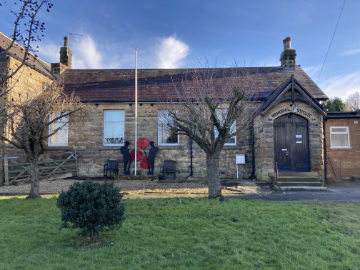Introduction
The village of Pannal is situated just south of Harrogate in North
Yorkshire. Historically, the parish of Pannal belonged to the West
Riding of Yorkshire and in 1911 covered an area of 4,040 acres (1,635
hectares) which extended westwards through Beckwithshaw and northwards
into Low Harrogate. At that time, the population of the parish was
recorded as 1,963.
The census of thirty years earlier had shown that 26% of males with
identifiable occupations were working in Agriculture, with lesser
numbers accounted for by House, Furniture and Decorations (17%),
Professionals (9%), Food or Lodging (8%), Domestic or Office Services
(7%), and Conveyance of men, goods or messages (6%).

The Pannal Memorial Institute has its origins in a parish meeting held to consider a proposal to create a village institute in memory of the local men who had lost their lives in the 1914-18 war. Following a canvass of the village, it was decided that the Oddfellows Hall, a building dating from 1888 and owned by the Society of Oddfellows, would be well suited for the purpose. A purchase price was agreed and on 11th November 1919, exactly one year after the signing of the Armistice, the hall was opened as the Pannal Memorial Institute by Major Edward Peel Cross, a local solicitor who had been appointed captain and adjutant of the 5th Battalion, West Yorkshire Regiment (Prince of Wales’s Own) following the outbreak of war.
Twenty-nine men are named on the 1914-18 memorial that can be found inside the Institute. Their full names are listed in the left-hand menu bar and biographical details of each man can be accessed by clicking on his name. The homes of the twenty-nine are mapped below.
On the north wall of the nave in St. Robert's Church, Pannal, there is a brass plaque which commemorates the men from the parish who fell in the Great War of 1914-1919. There are several differences from the memorial in the Institute: four men are absent (Maurice Lamb (commemorated at Kirkby Overblow), George Lumby, George Towse and Robert Towers) while four others are included (Charles Blackburn, Kenneth Dixon, Ernest Morrell, and James Weatherhead, an uncle of Allan and Arthur Weatherhead).
Any help to improve the content of these pages would be welcomed.
